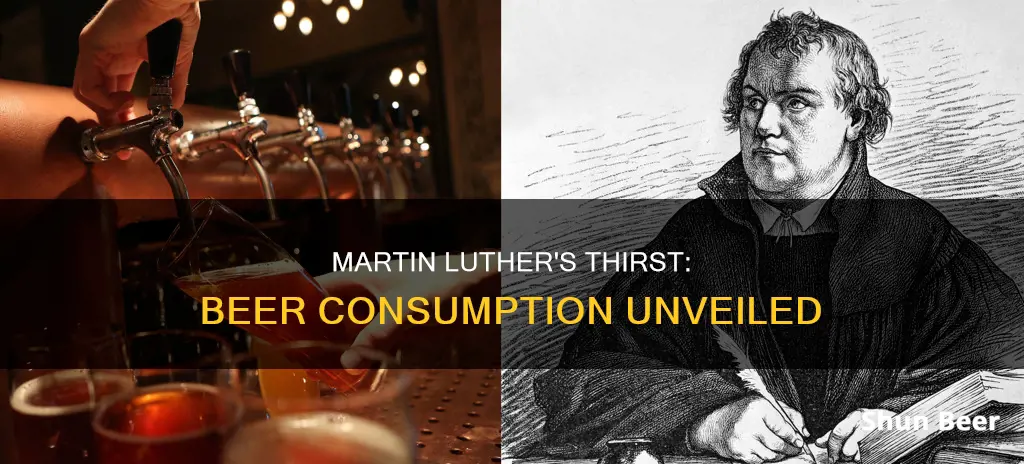
Martin Luther, the German monk-revolutionary, is known for sparking the Catholic dissent that led to the Protestant Reformation. Luther was a beer enthusiast, and his love for beer is well documented in his letters and sermons. In one letter to his wife, Katharina, he wrote, Yesterday I drank something which did not agree with me, so that I had to sing...You would do well to ship the whole cellar full of my wine and a bottle of your beer to me here, as soon as you are able; otherwise I will not be able to return home because of the new beer. Luther also promoted the use of hops in beer as an act of rebellion against the Catholic Church, which had a monopoly on gruit, the mixture of herbs and botanicals used to flavour and preserve beer. Luther's wife, Katharina, was also a brewer, and the couple received a barrel of excellent Einbeck beer as a wedding gift. Luther's favourite beer was said to be Einbeck beer, which was available across Germany and shipped as far as Jerusalem.
What You'll Learn

Luther's wife, Katharina, brewed beer
Katharina von Bora, also known as Katharina Luther, was an exceptional woman. She was a former nun who married Martin Luther in 1525. She escaped her convent with Luther's help in 1523, in response to his reform movement. In addition to her domestic duties, she also bore six children, ran a farm, supervised servants, and operated a successful brewery.
Katharina was an adept brewer, having learned the skill during her time in the convent. She brewed her own beer, which was said to be of high quality, and sold it to provide for her family. She also used it for her household, as drinking beer was common at the time due to unsafe water sources. In addition to selling and drinking her own brew, Katharina also enjoyed her husband's beer. Luther wrote about his love for beer and home-brewed ale many times. He even praised Katharina's brewing skills in his letters, claiming that he missed their home-brewed beer when he was away.
Katharina's brewing skills extended beyond simply making beer. She also brewed specific ales with medicinal herbs to help Luther when he was unwell. Luther suffered from various ailments, and Katharina's knowledge of herbs and brewing allowed her to create remedies to help him.
The couple's shared love for beer is well-documented, and it is clear that Katharina's brewing skills played an important role in their lives. Not only did she provide for her family and tend to her husband's health, but she also contributed to the enjoyment and delight of her household and guests.
Brown Bag Beer: Is Drinking in Public Legal?
You may want to see also

Luther's favourite beer was Einbecker
Martin Luther, the famous German priest, theologian, and instigator of the Protestant Reformation, was known to be a lover of beer. In fact, he once boasted that he could easily down three mugs of beer, each marked with one of the three major Christian texts: the Ten Commandments, the Creed, and the Lord's Prayer.
Luther's favourite beer was reportedly Einbecker, a bock-style beer from the town of Einbeck in Lower Saxony, Germany. Einbeck was known for its bock beer during the 14th century, when the beer trade in the city was already significant. The town had around 700 master brewers at the time, and the whole community was involved in beer production as everyone had the right to brew.
The first city record in Einbeck that mentions beer dates from April 28, 1378, and refers to the sale of two casks of "Einbecker" beer to the town of Celle, some 130 kilometres away. Einbecker Brewery, the only remaining brewery in Einbeck today, claims the tradition with the inscription "without Einbeck there would be no bock" above its door.
Luther is said to have received a cask of Einbecker beer before his 1521 trial for heresy, during which he was excommunicated from the Catholic Church. He also received a barrel of Einbecker in June 1525 as a wedding gift from the city of Wittenberg when he married Katherine von Bora, a former nun who had run away from her convent to join Luther's movement.
Luther's endorsement of Einbecker beer was a significant boost for the brand, as he was a famous figure at the time with many supporters. His praise for the beer is thought to have helped it gain recognition and customers beyond its home city and country.
Luther was also a champion for drinking in moderation, despite his own love of beer. In a sermon he gave in 1539, he preached:
> "It is possible to tolerate a little elevation, when a man takes a drink or two too much after working hard and when he is feeling low. This must be called a frolic. But to sit day and night, pouring it in and pouring it out again, is piggish… all food is a matter of freedom, even a modest drink for one’s pleasure. If you do not wish to conduct yourself this way, if you are going to go beyond this and be a born pig and guzzle beer and wine, then, if this cannot be stopped by the rulers, you must know that you cannot be saved. For God will not admit such piggish drinkers into the kingdom of heaven."
IBS Medication and Beer: Is It Safe to Drink?
You may want to see also

Luther promoted hops in beer as an act of rebellion against the Catholic Church
In the 16th century, the Catholic Church had a monopoly on gruit, a mixture of herbs and botanicals used to flavour and preserve beer. As the Church taxed most things under its control, this also applied to gruit, further angering Martin Luther, who was already opposed to the Catholic Church and was an acknowledged beer drinker.
Hops, on the other hand, were not taxed. They were considered invasive weeds, but they grew in abundance. And, as it turned out, hops were an effective preservative for beer. So, as part of his rebellion, Luther and his followers turned to hops as an alternative for their brewing needs.
The use of hops in beer was, therefore, an act of rebellion against the Catholic Church. As William Bostwick, beer critic for The Wall Street Journal, says, "If you were a Protestant brewer and wanted to thumb your nose at Catholicism, you used hops instead of herbs."
Even before the Reformation, German princes had been moving towards hops. For instance, in 1516, a Bavarian law mandated that beer could only be made with hops, water, and barley. But Luther's revolt gave this movement a significant boost. The fact that hops were tax-free was part of the appeal, but hops also had excellent preservative qualities, which meant beer could travel well and become a unit of international trade.
Luther would have relished his role in promoting hops. He was a stout, sensual, and gregarious monk who loved and appreciated good beer. His letters often mentioned beer, and he once wrote to his wife, Katharina, "I keep thinking what good wine and beer I have at home, as well as a beautiful wife. You would do well to send me over my whole cellar of wine and a bottle of thy beer."
Beer and Penicillin: A Dangerous Mix?
You may want to see also

Luther's teachings were mocked as sour beer
Martin Luther's teachings were mocked as "sour beer", but the man himself was a self-proclaimed lover of good beer. In fact, he once boasted that he could down three mugs of beer, each with a different religious inscription, with ease. Luther's affinity for beer was well-known, and he even received a barrel of Einbeck beer as a wedding gift.
Luther's wife, Katharina von Bora, was the brewer of the family. Her initial attempts at brewing produced a thin, weak brew, but she soon perfected her technique and learned exactly how much malt to add to suit her husband's taste. Luther was ecstatic — he called her Lord Katie as she had assured him a steady supply even when Wittenberg's breweries ran dry. Luther's love for beer was such that he even praised Naumburg beer for its laxative properties in one of his last letters to his wife before he died.
Luther's promotion of hops in beer was also an act of rebellion against the Catholic Church. In the 16th century, the Catholic Church had a monopoly on gruit, the mixture of herbs and botanicals used to flavour and preserve beer. Hops, on the other hand, were not taxed and grew plentifully and vigorously. Luther and his followers thus embraced the use of hops as an act of defiance against the Church.
While Luther clearly loved his tankard, there is no record of him being a drunkard. In fact, he could be quite a scold when it came to drunken behaviour. He lamented the German addiction to beer, saying, "such an eternal thirst, I am afraid, will remain as Germany's plague until the Last Day." He also once declared, "I wish brewing had never been invented, for a great deal of grain is consumed to make it, and nothing good is brewed."
Beer at the First Thanksgiving: What We Know
You may want to see also

Luther's views on drinking in moderation
Martin Luther, the German monk-turned-revolutionary who played a decisive role in reshaping the Church, was a lover of beer. He once said, "Whoever drinks beer, he is quick to sleep; whoever sleeps long, does not sin; whoever does not sin, enters Heaven! Thus, let us drink beer!" However, he was also a strong advocate for drinking in moderation.
Luther also recognized the social and cultural context of drinking in his time. During the Middle Ages, water was often unsafe to drink, and beer was considered a safer and more nutritious alternative. It was a common beverage, and in an age where refrigeration was not available, the fermentation process helped to preserve the drink. Luther understood that drinking was a social activity and that it could be enjoyed in moderation.
In his "Sermon on Soberness and Moderation," delivered on May 18, 1539, Luther provided a nuanced perspective on alcohol consumption. He acknowledged that it was acceptable to have "a little elevation" after working hard or when feeling low. However, he cautioned against excessive drinking, saying, "to sit day and night, pouring it in and pouring it out again, is piggish." He emphasized that drinking should be done in moderation and that being drunk was not compatible with Christian teachings. Luther's views promoted a balanced approach to alcohol consumption, allowing for enjoyment while also maintaining self-control and a clear mind.
Luther's wife, Katharina, was also a brewer, and he often boasted about her brewing skills. He enjoyed local beer and supported the use of hops in beer production, which was an act of rebellion against the Catholic Church's monopoly on gruit, the mixture of herbs and botanicals used for flavoring and preservation. Luther's promotion of hops contributed to the development of craft brewing and the beer culture that continues to this day.
Yoga and Beer: A Relaxing, Fun Workout
You may want to see also
Frequently asked questions
There is no clear record of how much beer Martin Luther drank, but it is clear that he was a beer enthusiast. He is known to have suffered from constipation and insomnia, and he found that local beers helped with these issues. Luther also suffered from a "great eternal thirst", lamenting the German addiction to beer.
Yes, Luther's wife, Katharina von Bora, brewed beer. Luther praised his wife's brewing skills in letters to his friends, and he once said that he had "a beautiful wife and good wine and beer at home".
It is likely that Luther drank alcohol every day. In the 16th century, water was often unsafe to drink, and beer was considered more nutritious. Luther is also quoted as saying, "I keep thinking what good wine and beer I have at home, as well as a beautiful wife".







